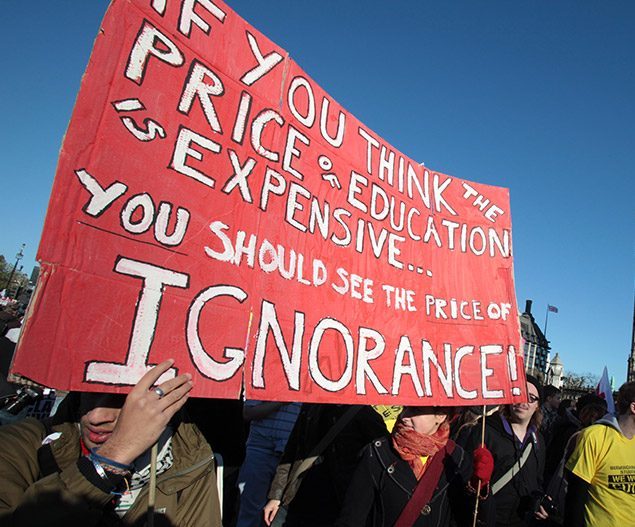Jaffa was wrong about the root of today's academic problems.
Defund the Ivies!

Universities will continue as they are—unless the money stops flowing.
Halfway through his account of the events at the Claremont Colleges in the late 1960s, Harry Jaffa declares that his “greatest disappointment was the Claremont College trustees.” When called upon to resist student demands—for a black studies department, for curricular changes to de-emphasize Western culture, and the like—these big money men were “invariably friendly and invariably patronizing.” Although promising to resist, they failed to do so. Their “cowardliness and utter lack of conviction” were striking and dispiriting.
This story resonates with my own experiences at my home institution, University of Pennsylvania Law School. After publishing a newspaper op-ed last year that praised bourgeois virtues and declared that not all cultures are equally worthy, I was publicly condemned by 33 of my colleagues. When it was discovered that I had reported in a video interview that black students rarely performed well in my first-year required law class, my Dean accused me of bias and stripped me of my first-year teaching duties. In the wake of these developments, no trustee, donor, or overseer at Penn came to my defense—save one. A brave and clear-eyed gentleman named Paul Levy, one of Penn Law’s biggest donors, resigned his trustee position and doggedly protested my treatment. Despite sending Mr. Levy many private messages of encouragement and support, other Penn alumni were unwilling to join him in publicly condemning the law school’s response to my writings and statements. He stood alone.
The situation in the academy today is in some respects less alarming than in the 1960s. Radical acts of violence against persons and property of the kind Jaffa describes are now rare. But the present is far worse in other ways. An ever-more left-leaning faculty, supported by myriad like-minded administrators, has consolidated its control over the university and allowed an identity-based grievance culture to flourish. Students are routinely allowed to shut down civil debate by slurring and tarring dissenters. Victim groups demand special favors and protections. Their complaints are indulged and demands catered to without question. But one feature of the university that Jaffa describes remains a constant: the wealthy donors, trustees, and alumni who help keep our enormously expensive institutions afloat take a hands-off attitude and look the other way. They rarely question what happens on campus.
Indeed, the hope of finding alumni and donors willing to question our universities’ illiberal tendencies is dimmer now than ever. What explains this? As Charles Murray has masterfully shown in Coming Apart, well-off graduates of prestigious universities are now more likely than in past decades to live, work, and socialize together, separated and walled off from the rest of society. As a progressive, moralized monoculture has taken hold in this milieu, the social costs of questioning it have sharply increased. Dissenters are tarred as racist, sexist, white supremacist, and bigoted. In the most rarefied precincts, there is nothing worse than being outed as a Republican.
Also, in an ever more crowded and competitive economy, the payoff from remaining on the good side of prominent universities has never been greater. Bryan Caplan argues in The Case Against Education that a prestigious B.A., which is the entrée to the most desirable jobs, functions primarily as a signal of ability and diligence. If so, what matters is getting in and getting through, not what students actually learn. This creates what I term the “Little Caitlin” problem: Second-guessing the priorities of faculty and administrators is not the way to get children, relatives, and friends into Harvard, so alumni and donors have zero incentive to meddle with what happens on campus and with the content of the education their contributions bankroll. The focus is on securing that selective slot!
Unfortunately, private generosity, while favoring the interests of the powerful, produces a collective dysfunction. The cultural depredations of the one-sided, anti-Western, multicultural indoctrination that now passes for an elite education are devastating over the long haul and divisive for society as a whole. What is to be done? Although private donors have every reason to avoid confronting campus decadence, might they be persuaded that there are better ways to improve people’s lives and to help the ordinary, average, un-special people who will never get near the tiny enclaves of selective colleges—those who have been unduly neglected by our elites and are increasingly walled off from them? Supporting vocational education, providing grants for job training, funding local infrastructure improvement, cleaning up, monitoring, and beautifying public spaces, rebuilding civic institutions, establishing K-12 public school art, music, and enrichment programs, helping pay relocation costs of ordinary workers, supporting regional theaters, and contributing to summer camp or travel funds for children of modest means are just a few possibilities that the wealthy should consider in lieu of large, high-profile gifts to elite universities. And although university-based science and medicine would appear to be above politics, they are not. Copious government funding for science includes generous allotments for pet university priorities, including diversity and inclusion programs and a plethora of interest-group-driven mandates and rules. Private funds would better be used to support innovative, lean, focused, non-university-based institutions unencumbered by overhead allotments and expensive regulations.
In short, money talks. Until the big money spigot is turned off, the fat and happy academic establishment has no incentive to change. The challenge of getting donors to rethink their priorities is formidable but not insurmountable. “Defund the Ivies” is a worthy rallying cry.
The American Mind presents a range of perspectives. Views are writers’ own and do not necessarily represent those of The Claremont Institute.
The American Mind is a publication of the Claremont Institute, a non-profit 501(c)(3) organization, dedicated to restoring the principles of the American Founding to their rightful, preeminent authority in our national life. Interested in supporting our work? Gifts to the Claremont Institute are tax-deductible.
Our universities are being transformed into institutions of professional training and certification.
Our universities' loss of intelligent direction is a greater threat than their radicalization.
Colleges today encourage students to conflate youthful arrogance with high moral purpose.
The cowardice of our faculty and administration continues unabated.
This week's feature is based on the following essay (downloadable as a PDF) written by Professor Harry V. Jaffa in 1989, which served as his farewell address to full-time faculty status at Claremont McKenna College. It remains an illuminating and prophetic statement in response to political correctness and the decay of higher education in contemporary America. The newly published book of his writings from which it is taken can be purchased at the link below.






